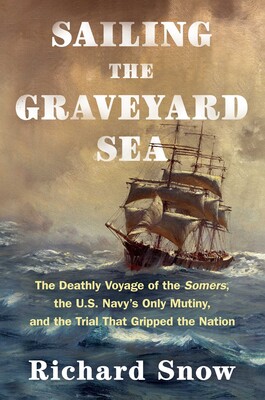Sailing the Graveyard Sea
“Superb—provocative and unnerving. . . . a tour de force. [Snow] has impressively smooth control of his depraved, devastating material.”
“A masterpiece of maritime history lifted straight from the gun decks of an American brig-of-war in the great age of sail.”

On December 14, 1842, the U.S. brig-of-war Somers dropped anchor in New York Harbor at the end of a voyage intended to teach a group of shore-born boys to become “apprentice sailors” who knew at least the rudiments of naval life. But this routine exercise ended in catastrophe. Commander Alexander Slidell Mackenzie came ashore claiming he had prevented a mutiny that would have left him and his officers dead.
Some of the thwarted mutineers were being held under guard, but three had already been hanged at sea, among them eighteen-year-old Philip Spencer—whose father was the Secretary of War, John Spencer. According to his commander, Philip had been the ringleader who encouraged the crew to seize the ship and become pirates so that they might rape and pillage their way through the northern coast of South America and the Caribbean. Yet it soon became clear that the order that condemned the three men had no legal basis. And, worse, it appeared possible that no mutiny had actually occurred, and that the ship might instead have been seized by a creeping hysteria that ended in the sacrifice of three innocents.
Months of accusations and counter-accusations were followed by a highly public court-martial that put Mackenzie on trial for his life—and led to the birth of Annapolis, the naval academy that within a century would produce the mightiest navy the world had ever known.
“[Snow] deftly recounts that mortal episode, which helped to set the Navy on a modern course… [he] offers a compelling psychological portrait of the antagonists . . . Drawing on contemporary accounts, Mr. Snow vividly evokes the myriad trials faced by the so-called saplings.”
“Sailing the Graveyard Sea has all the attributes of a sea thriller: mutiny, piracy, intrigue, murder, opposing forces, and newsworthy vilification. . . . absorbing [and] well-researched.”
“Richard Snow has brought forth the literary equivalent of a perfect storm in which nineteenth-century adventure, true crime, and high drama on the high seas all come together in the hands of a master storyteller operating at the height of his considerable powers. Sailing the Graveyard Sea braids the poetic force of Herman Melville with the narrative flair of Patrick O’Brian to create a dark, tightly strung, and deeply unsettling chapter in the saga of the United States Navy.”
“Gripping . . . Snow delves into the investigation and courtroom drama, drawing on court transcripts to vividly recreate scenes on board the Somers.”
“As engrossing as Nathaniel Philbrick’s . In Richard Snow’s masterful hands, the collision between a brash, young, wannabe pirate and his rash, too-proud, unyielding commanding officer is a sea story for the ages. What happened on Somers during a routine U.S.Navy voyage in 1842 is as shocking and unsettling today as it was in its day.”
“A page-turning history of an infamous mutiny . . . consistently compelling. . . . Much of the book’s appeal derives from Snow’s tart commentary . . . readers of this iteration will find it an absorbing one. A hell of a yarn.”
“First Snow’s watershed New York Times book review revived Patrick O’Brian’s Aubrey-Maturin “First Snow’s watershed New York Times book review revived Patrick O’Brian’s Aubrey-Maturin novels for a new generation; now he delivers a masterful account of one of the most intriguing episodes of U.S. Naval history. The moral questions raised by the Somers mutiny echo throughthe ages—but never so profoundly, or with such intensity, as in Sailing the Graveyard Sea.”